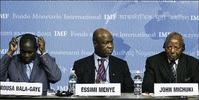
Kenya Finance Minister John Michuki (right), speaks during a news conference as Cameroon Finance Minister Essimi Menye (centre), and Gambia's Finance Minister Mousa G. Bala-Gaye listen at the International Monetary Fund Saturday. - AP
WASHINGTON (AP);
President George W. Bush emerged from a meeting with foreign financial officials on Saturday and pledged a global response to the credit crisis that will lead towards a "path of stability and long-term growth".
Bush announced no new strategies to attack the economic woes circling the globe, stressing instead, "We will do what it takes to resolve the crisis and the world's economy will emerge stronger as a result."
The president spoke in the Rose Garden outside the White House, joined there in a show of solidarity not long after daybreak by finance officials from the G-7 - Japan, Germany, Britain, France, Italy and Canada, in addition to the United States. Treasury Secretary Henry Paulson and Secretary of State Condoleezza Rice also attended.
"The United States has a special role to play in leading the response to this crisis," the president said. "That is why I convened this morning's meeting here at the White House and it is why our government will continue using all the tools at our disposal to resolve this crisis."
He added, "As our nations carry out this plan, we must ensure that the actions of one country do not contradict or undermine the actions of another. In an interconnected world, no nation will gain by driving down the fortunes of another. We are in this together. We will come through it together."
Worsening the global downturn
Bush's comments were aimed at avoiding the mistakes that worsened economic conditions during the Great Depression in the 1930s. Then, some nations pursued go-it-alone strategies such as erecting protectionist trade barriers to shield their domestic industries. Those trade barriers ended up only worsening the global downturn.
In the current crisis, Ireland moved to guarantee all bank deposits, a decision that triggered similar actions in Germany and other nations which were concerned that nervous depositors would move their bank accounts to Ireland. The White House meeting lasted about a half-hour, less than scheduled.
Officials from the Group of 20 countries - which include the wealthiest and the world's biggest developing nations such as China, Brazil and India - planned to attend a meeting Saturday evening that Paulson requested to explain the actions that US and other wealthy nations have taken.
For Bush, it was the 22nd time in 27 days that he has spoken publicly about the financial crisis. Congress heard testimony last week that the retirement accounts of Americans have lost $2 trillion in the past 15 months, and the New York Stock Exchange Dow Jones industrials average plummeted more than 18 percent last week alone. The average had its worst week on record in both point and percentage terms.
A wave of selling sent markets lower in several Asian and European nations on Friday, while other exchanges were closed to prevent the same fate.
The stock selloffs stem from fears that banking systems have essentially frozen up around the world - a credit crisis that took hold sharply three weeks ago in the United States and has led to an escalating series of interventions by the administration and Federal Reserve. Officials have also spoken openly of concerns that the United States may be headed for a potentially deep recession.
Desperate measures
It was only eight days ago that Congress approved a $700 billion bailout for the financial industry, and the Fed has pumped billions of dollars into the economic system hoping to provide greater access to credit for potential borrowers.
On Friday, Paulson announced the Treasury would begin buying part ownership in American banks, an effort similar to a programme tried beginning in the Great Depression.
The administration's decision is aimed at restoring the depleted capital reserves of banks, which have been forced to cut back on loans because they have suffered billions of dollars in losses in the current mortgage meltdown.
The G-7 officials discussed the global economic crisis for three hours on Friday and issued one of the shortest communiqués in the history of the group. It pledged to take "all necessary steps to unfreeze credit and money markets" to end the crisis.
Billions injected
Overseas officials also have injected billions of dollars of reserves into their banking systems with little effect so far. As the markets plunged this past week, however, the US and other countries accelerated their efforts.
The G-7 statement endorsed a programme to prevent the failure of major banks in each of the countries, unfreeze credit and money markets, bolster capital and deposit-insurance programmes and get the battered mortgage financing system operating more normally.
It was the meltdown of the subprime mortgage market with cascading defaults that triggered the start of the credit crisis in the United States in August 2007.
While the G-7 group did not endorse all the plans put forward, such as a proposal from Britain that countries guarantee the loans that banks make to each other, the finance ministers said they believed they had agreed on a comprehensive plan that would show results.
The question of how countries can deal with the spreading financial crisis was dominating discussions at the weekend meetings of the 185-nation International Monetary Fund and its sister lending institution, the World Bank.

